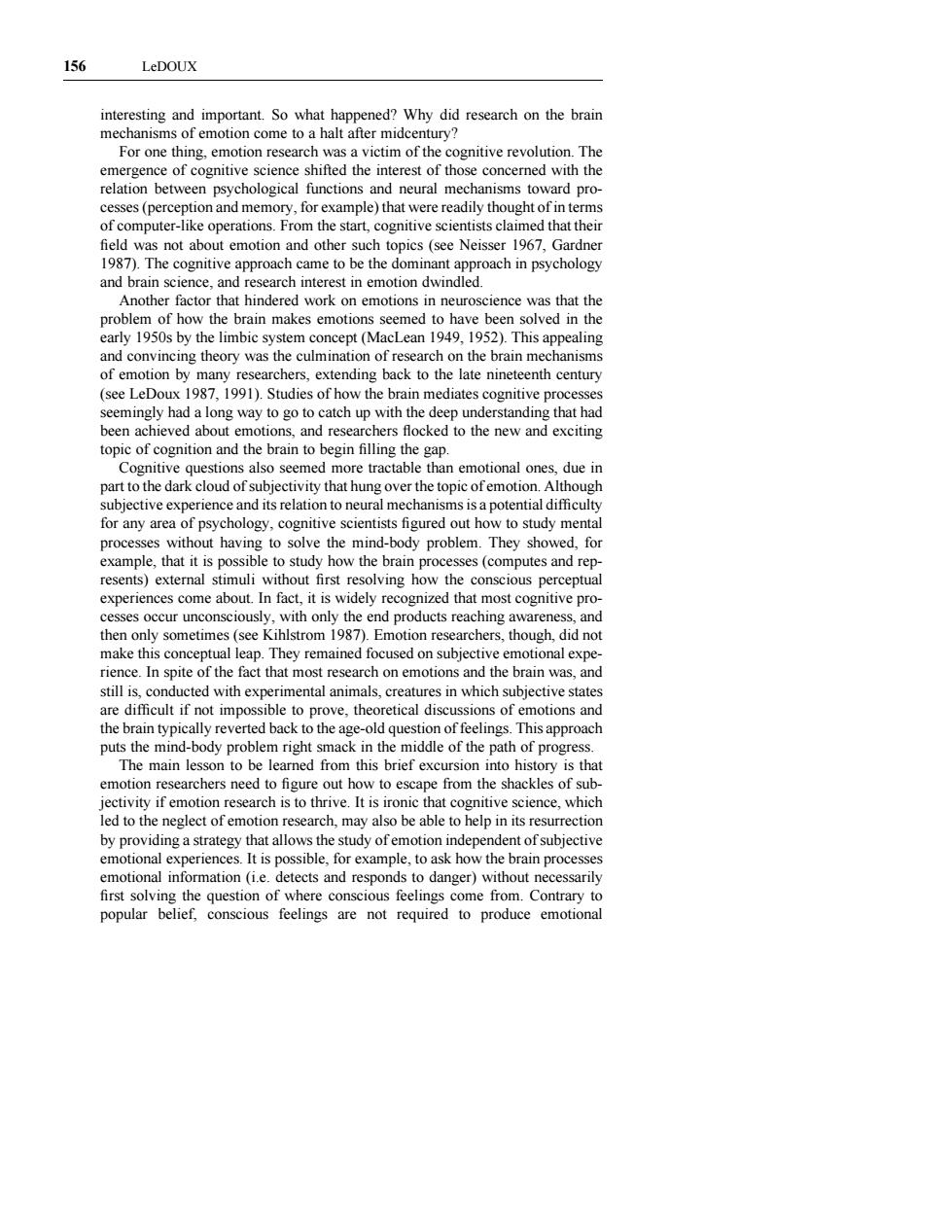正在加载图片...

156 LeDOUX interesting and important.So what happened?Why did research on the brain mechanisms of emotion come to a halt after midcentury? For one ing.en on research was a victim of the cognitive revol cesses(perception and memory,for example)that were readily thought omputer-I operation m the start,cognitive sc】 nat the eld 19870 to be the(se and brainscnd researchnterestmotionwnded and convincing theory was the culmination of research on the brain mechanisms of emotion by many researchers,extending back to the late nineteenth century (see LeDoux 1981991).Studies of how the brain mediates cognitive proce topic of cognition and the brain to begin filling the gap. Cognitive questions also seemed more tractable tha emotional ones due in vity that hung o top for anarea of.cognitive scientists figured out how to study mental processes without having to solve the mind-body problem.They showed,for example.that it is possible to how the brain proc ses(computes and rep ed that most comitive esses occur unconsciously,with only the end products reaching awareness, and e fact ey remaine nd the hrain Ψ still is,conducted with experimental animals.creatures in which subjective states are difficult if not impossible to prove,theoretical discussions of emotions and o the a ge-ol d que idd g.This approach The main lesson to be ed from this brief ex into history is that emotion researchers need to figure out how to escape from the shackles of sub tviifcmotion research is to thrive.It is ironic that cognitive science,which 0 o be It is possible for aml toask how the brain pr emotional information(ie.detects and responds to danger)without necessarily us feelings come from Contrary to lings are no156 LeDOUX interesting and important. So what happened? Why did research on the brain mechanisms of emotion come to a halt after midcentury? For one thing, emotion research was a victim of the cognitive revolution. The emergence of cognitive science shifted the interest of those concerned with the relation between psychological functions and neural mechanisms toward processes (perception and memory, for example) that were readily thought of in terms of computer-like operations. From the start, cognitive scientists claimed that their field was not about emotion and other such topics (see Neisser 1967, Gardner 1987). The cognitive approach came to be the dominant approach in psychology and brain science, and research interest in emotion dwindled. Another factor that hindered work on emotions in neuroscience was that the problem of how the brain makes emotions seemed to have been solved in the early 1950s by the limbic system concept (MacLean 1949, 1952). This appealing and convincing theory was the culmination of research on the brain mechanisms of emotion by many researchers, extending back to the late nineteenth century (see LeDoux 1987, 1991). Studies of how the brain mediates cognitive processes seemingly had a long way to go to catch up with the deep understanding that had been achieved about emotions, and researchers flocked to the new and exciting topic of cognition and the brain to begin filling the gap. Cognitive questions also seemed more tractable than emotional ones, due in part to the dark cloud of subjectivity that hung over the topic of emotion. Although subjective experience and its relation to neural mechanisms is a potential difficulty for any area of psychology, cognitive scientists figured out how to study mental processes without having to solve the mind-body problem. They showed, for example, that it is possible to study how the brain processes (computes and represents) external stimuli without first resolving how the conscious perceptual experiences come about. In fact, it is widely recognized that most cognitive processes occur unconsciously, with only the end products reaching awareness, and then only sometimes (see Kihlstrom 1987). Emotion researchers, though, did not make this conceptual leap. They remained focused on subjective emotional experience. In spite of the fact that most research on emotions and the brain was, and still is, conducted with experimental animals, creatures in which subjective states are difficult if not impossible to prove, theoretical discussions of emotions and the brain typically reverted back to the age-old question of feelings. This approach puts the mind-body problem right smack in the middle of the path of progress. The main lesson to be learned from this brief excursion into history is that emotion researchers need to figure out how to escape from the shackles of subjectivity if emotion research is to thrive. It is ironic that cognitive science, which led to the neglect of emotion research, may also be able to help in its resurrection by providing a strategy that allows the study of emotion independent of subjective emotional experiences. It is possible, for example, to ask how the brain processes emotional information (i.e. detects and responds to danger) without necessarily first solving the question of where conscious feelings come from. Contrary to popular belief, conscious feelings are not required to produce emotional